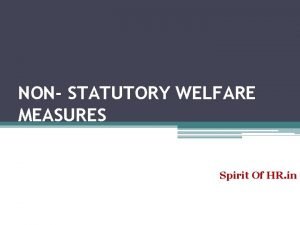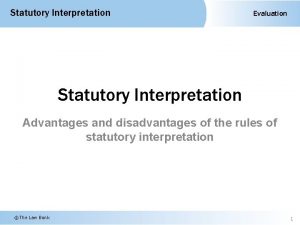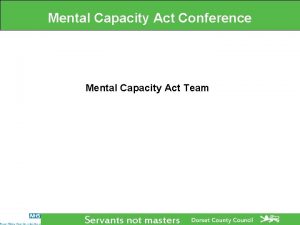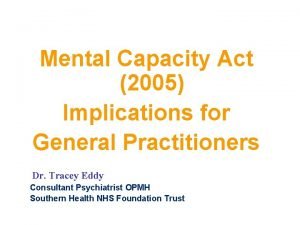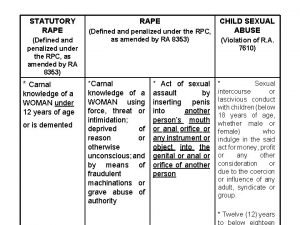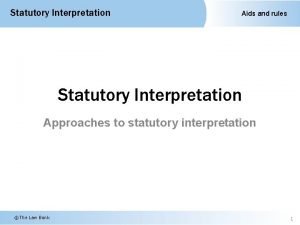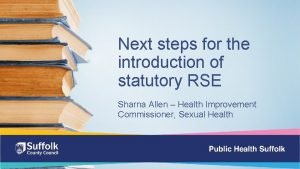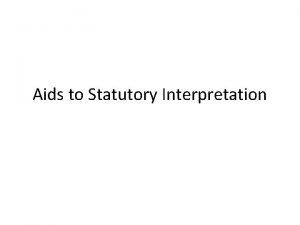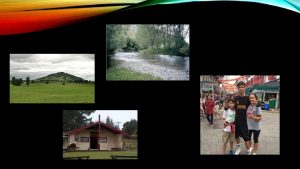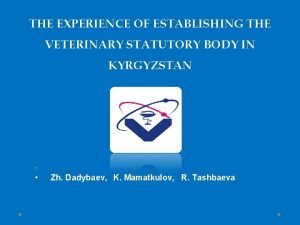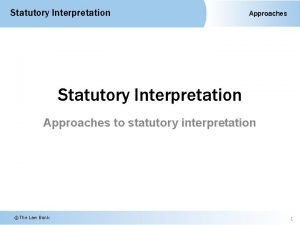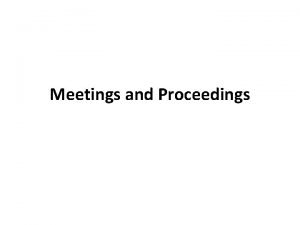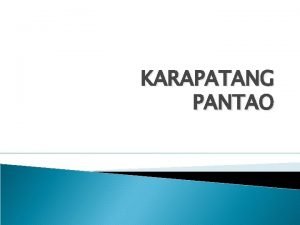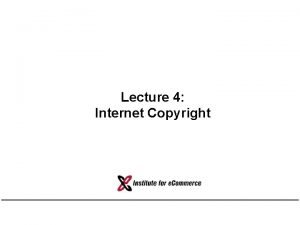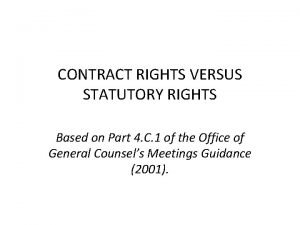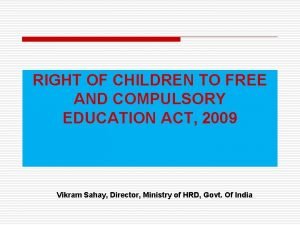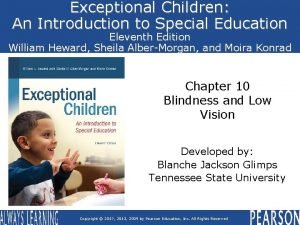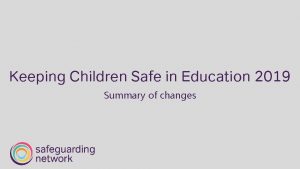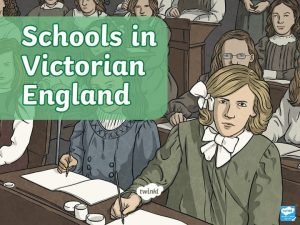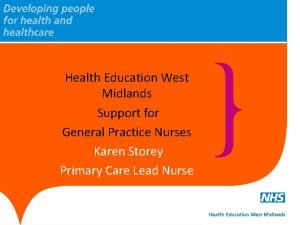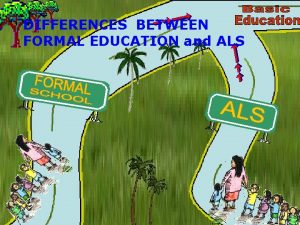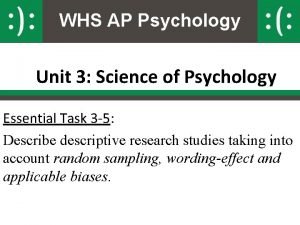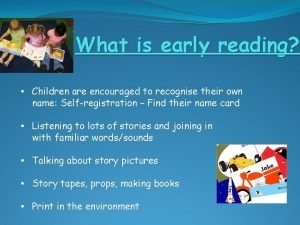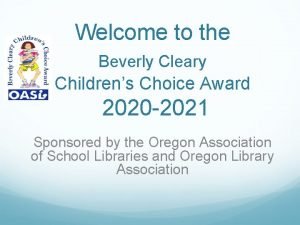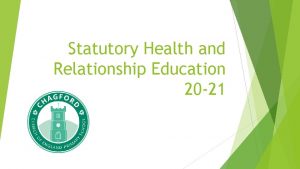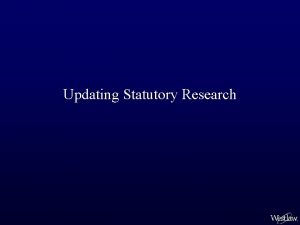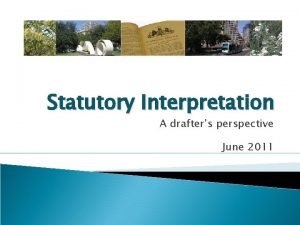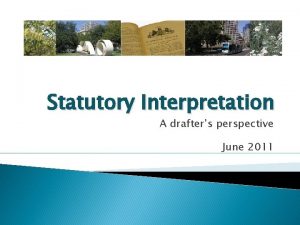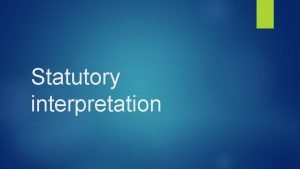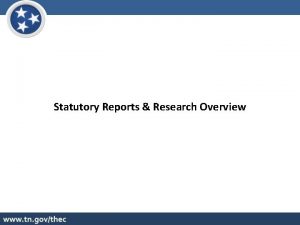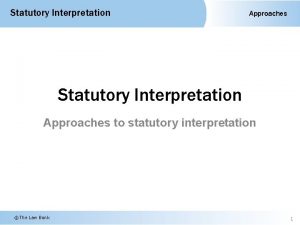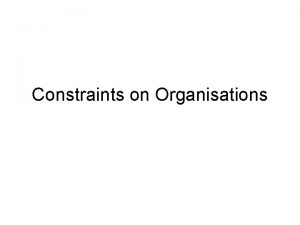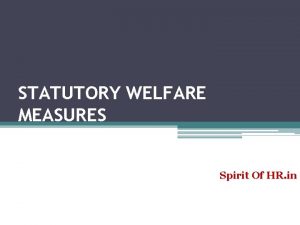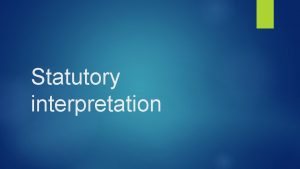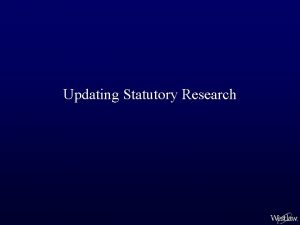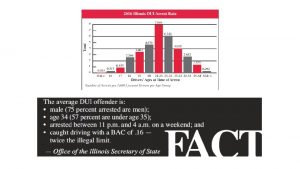Education in England Statutory Education Children in England









































- Slides: 41

Education in England

Statutory Education Children in England must attend school from 5 – 16 years of age.

Key Stages l l l l Foundation Stage 3 – 5 Key Stage 1 5– 7 Key Stage 2 7 – 11 Key Stage 3 11 – 14 Key Stage 4 14 - 16 GCSE Year 11 age 15/16 A Level Year 13 age 17/18

Types of School l State l Public l Private

State Education State education is organised centrally by the Department for Education and Science (Df. ES) and administered by Local Authorities (LAs).

State Schools l Nursery Age 3 - 4 (usually attached to a Primary School) l Primary Age 4 – 11 Infant (5 – 7) and Junior Schools (7 – 11) separate or combined

In some LAs …. l First School l Middle l Upper Age 4 – 9 School Age 9 – 13 School Age 14 - 18

Secondary Schools l Age l May 11, 12, or 13 – 18 be specialist schools i. e. Arts, PE, Languages, Technology.

Public Schools l Fee paying non-profit making l Usually entrance exam l Famous examples – Eton, Harrow, Winchester

Private Schools l Fee paying, profit making organisations l May have entrance exam l Pre-School Nursery Age 2 - 5

Ofsted l l All schools are regularly inspected by Ofsted to ensure they are meeting the required standards. Those failing to meet the standards are either ‘given notice to improve’ or put into ‘special measures’ or ‘serious weaknesses’ and given extra support (funding and consultancy time) to help them improve. They will have more frequent inspections than successful schools. Double check this applies to Private schools

Continuous Professional Development l l l l in Secondary Schools The first year National initiatives Externally provided INSET Internally provided INSET Further qualifications Monitoring Initiatives

CPD - The first year l Newly Qualified Teachers l l l l professional mentor subject mentor head of faculty regular meetings regular observations portfolio final assessment

CPD – National Initiatives l l National Literacy Strategy National Numeracy Strategy l l Roll out Every Child Matters

CPD – Externally provided INSET l l LEAs Commercial Agencies

CPD – Internally provided INSET l l l Sharing Best Practice Workshops Collaboration

CPD – Further Qualifications l l Dip. Ed CFPS MEd Minibus Licence

CPD – Monitoring l Performance Management l l l Observations Targets OFSTED

CPD – Initiatives l l TIPD TLC

CPD l l l l external courses TLC TIPD CFPS MEd Dip. Ed whole school INSET l l induction (NQT year) mobile classroom Observations Performance Management

ICT in CPD

Becta co-coordinates and disseminates research about use of ICT both in the classroom and for CPD. Current topics of interest include: • Use of Computer mediated communication CMC • Impact of ICT on initial teacher training • Use of electronic portfolios • Use of ICT to deliver CPD • Whether CPD helps teachers learn about integrate ICT into teaching process.

Using ICT in the training of School leaders National College for School leadership deliver training to senior and middle managers. Although some of this is done on a face to face basis. Most of the participants personal learning is via the NCSL website. Include print screen from NCSL website

Using ICT in the training of teachers • CMC for the sharing of good practice and resources Medheads, Herts good practice network • CD-Rom and Web-based support for non-specialist teachers both in the primary sector. • Online CPD portfolio development • Sir John Lawes School Learning Lounge. • National grid for Learning • Teachernet. gov. uk




Using ICT in initial teacher education. Skills tests in ITT Open university PGCE

Head teacher training in England

Tony Blair and Education In the run-up to the 1997 general election, Tony Blair said: 'Ask me my three main priorities for government and I tell you, education, education. '

The establishment of the NCSL Plans for a national college for school leadership were announced by the Prime Minister, Tony Blair, at the first New Heads Conference in 1998. Details of the College’s role were set out by then Secretary of State for Education, David Blunkett in an official remit letter NCSL : National College for School Leadership http: //www. ncsl. org. uk/

The remit of the NCSL l l l To provide a single national focus for school leadership development and research; To be a driving force for world class leadership in our schools and the wider education service; To be a provider and promoter of excellence ; a major resource for schools; a catalyst for innovation; and a focus for national and international leadership issues.

Continued commitment for the NCSL “NCSL has a pivotal role to play in equipping our school leaders with the skills and support they need in order to achieve our ambition of having a world class education system” Rt Hon Ruth Kelly MP

Entry to Headship National standards for headteachers National Professional Qualification for Headteachers http: //www. ncsl. org. uk/programmes/npqh/index. cfm

National standards for Headteachers l l l Shaping the future Leading teaching and learning Developing self and others Managing the organisation Securing accountability Strengthening community

New Visions l l l The real issues that headteachers confront every day provide much of the content of the programme. These are illuminated through six themes: Day 1: Learning-centred leadership Day 2: Leadership and accountability Day 3: Interpersonal leadership Day 4: Leading change, creating alignment Day 5: Shared and distributed leadership Day 6: Developing a community of practice

Links to the research (add more) l l Bennett, N. , Harvey, J. A. , Wise, C. and Woods, P. A. (2003) Distributed Leadership: A Desk Study, www. ncsl. org. uk/literature reviews. Hargreaves, D. (1999) ‘The Knowledge. Creating School. ’ British Journal of Educational Studies. 47 (2) 122 -144

New Visions Learning Model

Advanced leadership Leadership programme for serving headteachers (LPSH) http: //www. ncsl. org. uk/programmes/lpsh/index. cfm Key elements of the programme Ø Feedback from colleagues: 360 -degree picture Ø Co-coaching Ø Individual reflection Ø Committing to change l

Impact?

 Statutory and non statutory welfare measures
Statutory and non statutory welfare measures Statutory interpretation quiz
Statutory interpretation quiz Advantages and disadvantages of golden rule
Advantages and disadvantages of golden rule 5 principles of the mental capacity act
5 principles of the mental capacity act Mental capacity assessment example
Mental capacity assessment example National curriculum core subjects
National curriculum core subjects Statutory rape rpc
Statutory rape rpc Muir v keay
Muir v keay Statutory relationship
Statutory relationship Statutory rse
Statutory rse Extrinsic and intrinsic aids to statutory interpretation
Extrinsic and intrinsic aids to statutory interpretation Statutory fund cooperative
Statutory fund cooperative Independent maori statutory board
Independent maori statutory board Veterinary statutory body
Veterinary statutory body Purposive rule
Purposive rule Aids to statutory interpretation
Aids to statutory interpretation Statutory bonus meaning
Statutory bonus meaning Statutory law
Statutory law Non banking statutory financial organization
Non banking statutory financial organization Meeting proceedings
Meeting proceedings Hire purchase is governed by
Hire purchase is governed by Karapatan kapag nasasakdal
Karapatan kapag nasasakdal Statutory interpretation outline
Statutory interpretation outline Statutory rights example
Statutory rights example Child centred curriculum
Child centred curriculum Exceptional children an introduction to special education
Exceptional children an introduction to special education Keeping children safe in education 2019
Keeping children safe in education 2019 Exceptional children an introduction to special education
Exceptional children an introduction to special education Victorian punishments at school
Victorian punishments at school Health education england organisational structure
Health education england organisational structure Jane mamelok gmc
Jane mamelok gmc Health education england yorkshire and humber
Health education england yorkshire and humber Health education west midlands
Health education west midlands Venn diagram formal education and nonformal education
Venn diagram formal education and nonformal education Similarities between health education and health promotion
Similarities between health education and health promotion Extension education is non formal education
Extension education is non formal education Working with young children chapter 1
Working with young children chapter 1 Working together to safeguard children’ 2018 summary
Working together to safeguard children’ 2018 summary The lost children of rockdale county
The lost children of rockdale county Lars kristofferson is the ceo of kristoff markets
Lars kristofferson is the ceo of kristoff markets Children are encouraged to read
Children are encouraged to read Beverly cleary awards
Beverly cleary awards
